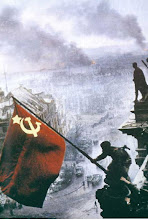

'A bit of fun for the time of year thats in it, and of course wishing all the regular readers of Unrepentant' a Merry Christmas and a Happy New Year in 2009, thanks also to those who nominated this blog into the top 100 political blogs here
 amount of traffic from around the globe, and thanks for all those of you have commented on the variety of postings put up by my angelic self over the year.
amount of traffic from around the globe, and thanks for all those of you have commented on the variety of postings put up by my angelic self over the year.
Its sometimes forgotten that in the USSR there was a whole festive period focussed around the New Year, this is further complicated by the fact the Russian Orthodox 'Christmas' is of course celebrated later than the western worlds.But this is not simply a product of official atheism under of Soviet times -- even in tsarist times, New Year's was the day associated with decorated trees, ''Santa,'' and the exchanging of gifts, because Christmas was not a festive holy day for Russian Orthodox Christianity. (Which, of course, observes Christmas in early January, since Eastern Orthodoxy never switched from the Julian to the Gregorian calendar.)
I'm not sure when the "New Year's Tree" custom developed in Russia, though it wouldn't surprise me if, like most non-Germans, they got the idea via Queen Victoria, who popularized what had been a strictly German custom in honor of her German husband.
I did receive quite a few Soviet Christmas/New year cards in the 1980's, but I like most other people I suppose dumped them. I was interested to find that there is now a band of Soviet christmas memorabilia collectors, who make a hobby of collecting the old Soviet Christmas cards of the past. I can understand why, they were always well designed, beautifully coloured and were as full of christmassy kitsch as anything on offer in the West. One such collector is Boris Glazer lives in Ekaterinburg,
 Russia. When asked how he began his soviet christmas card collection he said
Russia. When asked how he began his soviet christmas card collection he said
"As always, it began in childhood. New Year in the Soviet Union was the only official holiday not connected with communist ideology. In those days, it was the main winter holiday--a mix of Christmas and New Year. The Christmas Tree was substituted with New Year Tree. The star on its top was considered as the small sister of the Kremlin stars. But it did not spoil an atmosphere of a holiday, fun, kindness, and hope. In those days, when even telephone was not in each family, people congratulated each other with postcards. My grandmother had a lot of relatives in all corners of the USSR and they actively exchanged congratulations. When she passed away, there were few hundreds cards left after her which gave a start to my collection. The collection gradually grew and replenished, and later, when I was engaged in graphic design and programming, one of my projects consist in creation of a mosaic from New Year's cards. The part from these scanned cards can be seen on my site....My favorite cards are from '50s. It is the time of blossoming of socialist realism in the USSR. I very much like these detailed realistic images. And my wife loves cards from '60s when images became more abstract and flat. These were the times of the Iron Curtain and the first space flights. The postcards of that period combine a nice (sometimes "international" looking) drawing style with Russian national fairytale characters and impudent Soviet
 propaganda. Good old soviet kitsch!..."
propaganda. Good old soviet kitsch!..."
Interesting to see that the New Year was a time for children and families greeting each other in the USSR too , fulfilling a similar role as Christmas in the western world today, also interesting to observe that as was the case with many many aspects of Soviet life, there was space given for fun and festivities in contrast to the image of unremitting gloom which is the stereotypical image of Soviet life we are all expected to believe to this day....
Have a Wonderful Christmas and a Peaceful 2009 !






